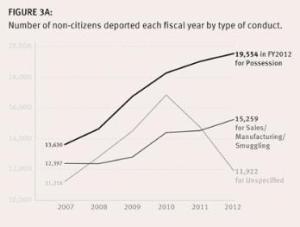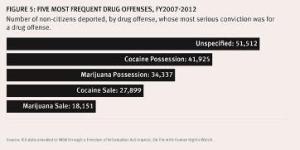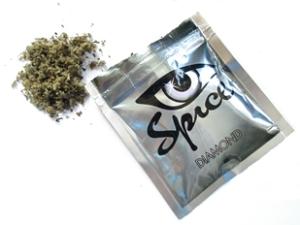Just a week after similar votes in the House, the Senate Appropriations Committee told the DEA to butt out of medical marijuana states.
A new report from Human Rights Watch finds that deportations for drug offenses are on the increase, with more than a quarter million in five years, including more than 34,000 for marijuana possession alone.
ProCon.org is a series of in-depth web sites presenting information and views from on current issues, several with relevance to drug policy. The Chronicle is currently running a series of info items from ProCon.org -- this one from felonvoting.procon.org -- and we encourage you to check it out.
The Senate sends a message to the DEA, a new study deflates fears of medical marijuana leading to increased teen pot-smoking, California continues to try to regulate its medical marijuana free-for-all, and more.
Four Chicago-land cops get popped for testilying, a New York cop tried to impress a woman and ends up on probation, another jail guard goes down, and more.
The Senate is following the House's lead in telling the DEA not to interfere in medical marijuana, two Michigan initiatives get the go-ahead for signature-gathering, a package of heroin bills passes the New York Senate, Vancouver gets tired of Cannabis Day, and more.
There's a new report on the impact of pot legalization in Ohio, the CDC sounds the alarm on "Spice," a CBD cannabis oil for kids bill passes in Delaware, and more.
A legislative compromise would let Oregon counties where voters opposed legalization ban pot shops, the Colorado Supreme Court rules in favor of employers over medical marijuana patients, two big eastern cities are on the verge of shifting their drug enforcement policies, and more.
There's good polling news for Michigan pot legalization campaigners, a South Dakota Indian tribe legalizes weed, a new study refutes concerns that allowing medical marijuana leads to increased teen use of the substance, and more.
Marijuana's going to be legal in Oregon next month, and a new website will help explain things, the focus is on Gov. Cuomo now that an emergency access medical marijuana has passed the New York legislature, Vermont's top jailer comes out for drug decriminalization, and more.
This article was published in collaboration with AlterNet and first appeared here.
Just last week, in a series of successful amendments to the Justice Department appropriations bill, the House sent a clear message to the DEA and DOJ to stop interfering in medical marijuana states. Today, a similar message came from the Senate.

Congress doesn't want the DEA messing with medical marijuana where it's legal. (wikimedia.org)
The Senate Appropriations Committee voted two-to-one today in favor of an amendment from Sen. Barbara
Mikulski (D-MD) that prohibits the Justice Department, including the DEA, from using federal funds to interfere in the implementation of state medical marijuana laws.
While the appropriations bill must still be approved by the Senate as a whole, both houses of Congress are now on record as telling the DEA to butt out of medical marijuana states. The passage of identical amendments in both houses is a good indicator that they will be included in the spending bill when it gets to President Obama's desk.
While the House has passed similar amendments for the last two years, this is the first time it was offered in the Senate. It mirrors the provisions of the CARERS Act (HR 1538/S.683), introduced earlier this year, but because a ban in an appropriations bill expires at the end of the fiscal year, advocates are still calling for the CARERS Act to move.
The vote was an impressive 21-9, with the only Democrat voting against it being Sen. Dianne Feinstein (D-CA). Republicans split right down the middle, with eight opposing and eight supporting.

California's senior senator, Dianne Feinstein, was the only Democrat to vote "no." (senate.gov)
"This is another resounding victory for medical marijuana patients, their families, and their care providers. Congress is making it clear that the Department of Justice and the DEA have no business interfering in state medical marijuana laws," said Dan Riffle, director of federal policy for the Marijuana Policy Project.
"The goal of this amendment is to provide deference to the states, making it strikingly similar to the operative provisions of the CARERS Act. Unfortunately, that bipartisan bill has languished for months in the Senate Judiciary Committee because Chairman Chuck Grassley has refused to hold hearings on it. The Senate spoke loudly and clearly today. Hopefully Sen. Grassley was listening," Riffle continued.
"With so many votes going our way these days, each new one gets less and less exciting. But that's a good problem to have," said Tom Angell, chairman of Marijuana Majority. "We're entering an era where marijuana reform is accepted as mainstream and not seen as controversial, and that's exactly where we want to be. With this vote, it's now clear that a growing bipartisan group of lawmakers in both chambers are ready to get the federal government out of the way of the effective implementation of state marijuana laws. These temporary funding restrictions certainly help us to demonstrate political momentum, but the next step should be passing legislation to permanently change federal law."
back to top
(This article was written in collaboration with AlterNet and first appeared here.)
The US government wants to throw Marsha Austin out of the country. The 67-year-old grandmother came from Jamaica to New York as a lawful resident in 1985, and has lived here ever since with her husband, seven children (two more are in Jamaica), grandchildren, and great-grandchildren. All are legal residents or US citizens.

Marsha Austin and her family in the Bronx (hrw.org)
That was "attempted criminal sale of a controlled substance in the third degree," to which she pleaded guilty on her public defender's advice. The attorney failed to tell her the conviction could lead to deportation.
Her convictions led to little or no jail time, but in 2010, as her husband's health faltered, she violated probation by drinking alcohol. She did 90 days in jail, but instead of walking out, she was seized by immigration authorities at the end of her sentence and spent the next 2 ½ years in immigration jail awaiting deportation.
Immigration and Customs Enforcement (ICE) repeatedly opposed her release, claiming she was under mandatory detention for her drug offenses, but then released her unexpectedly in 2013. She's been in treatment since then and now proudly reports that she's been "clean as a whistle" for the past five years. Now, her husband's health is failing, as is the health of her daughter, who suffered a breakdown after her own daughter suffered a serious illness.
"My kids and my grandkids, that's what I'm living for now," she said.
But she remains in limbo. The US government still wants to send her back to Jamaica, arguing that she is subject to deportation for the "aggravated felony" of buying $5 worth of crack for a narc.
She's not alone. Beginning late in the George W. Bush years and continuing through the Obama administration, the US has been deporting and trying to deport immigrants for drug offenses at a record clip. According to a just released report from Human Rights Watch, more than 260,000 non-citizens -- legal residents and illegal immigrants alike -- were deported for drug offenses between 2007 and 2012. Shockingly, 34,000 people were deported for marijuana possession offenses alone.
The trend is upward. The number of people deported whose most serious offense was a drug crime was up 22% over that period, while the number of people deported whose most serious offense was a drug possession offense was up even more, at 43%.
Tens of thousands more have been or are being detained indefinitely in immigration jails fighting pending deportation orders. Such extended imprisonments wreak havoc on the families who husbands or fathers, wives or mothers, are caught up behind bars.

hrw graph immigration.jpg
The Human Rights Watch report, "A Price Too High: US Families Torn Apart by Deportations for Drug Offenses," documents how the US government is routinely breaking up families by initiating deportation proceedings for drug offenses, often ones decades old or so minor they resulted in little or no prison time. Researchers interviewed more than 130 affected immigrants, families, attorneys, and law enforcement officials, and incorporated new data obtained from ICE.
Here are some of the cases examined in the report:
"Raul Valdez, a permanent resident from Mexico who had grown up in the Chicago area from the age of one, was deported in 2014 because of a 2003 conviction for possession of cannabis with intent to deliver, for which he had been sentenced to 60 days in jail.
Ricardo Fuenzalida, a permanent resident from Chile now living in New Jersey, was held without bond for months fighting deportation in 2013 because of two marijuana possession convictions from 13 years earlier.
Jose Francisco Gonzalez, a permanent resident in Anaheim, California, was put into deportation proceedings and held without bond in 2014 because of a 2001 arrest for having two pot plants, despite having successfully completed a California diversion program that promised to erase his criminal record.
Abdulhakim Haji-Eda, a refugee from Ethiopia who came to the US at the age of 13, has been ordered deported as a drug trafficker for a teenage drug sale in Seattle. Now 26 years old, he has no other convictions, and is married to a US citizen with two US citizen children and another on the way.
"Antonio S.," who came to the US from Mexico when he was 12 and was eligible for a reprieve from deportation as a "DREAMer" under the executive program Deferred Action for Childhood Arrivals, was detained for over a year in Colorado and deported after a conviction for possession of marijuana, a municipal violation to which he pleaded guilty without an attorney.
"Alice M.," a 41-year-old graphic designer and Canadian citizen, [was barred] from living in the US with her US citizen fiancé because of a single 1992 conviction for cocaine possession she received in Canada in her last year of high school, a conviction that was pardoned long ago in Canada.
"Mr. V.," a refugee and permanent resident from Vietnam, was ordered deported in 2008 for a 1999 conviction for possession of crack cocaine. Although he has since been granted a full and unconditional pardon from the state of South Carolina, Mr. V. remains under a deportation order and only remains in the US because of restrictions on the repatriation of certain Vietnamese nationals."

hrw immigration drug offenses numbers.jpg
The report notes that the Obama administration has been sensitive to the injustices of the war on drugs and urges it to be as sensitive to the harsh effects of its deportation policies related to drug offenses. But it is not just the federal government that can act to improve the situation. Here are the group's recommendations:
"To the United States Congress
Eliminate deportation based on convictions for simple possession of drugs.
Ensure that all non-citizens in deportation proceedings, including those with convictions for drug offenses, have access to an individualized hearing where the immigration judge can weigh evidence of rehabilitation, family ties, and other equities against a criminal conviction.
Ensure that refugees and asylum seekers with convictions for sale, distribution, or production of drugs are only considered to have been convicted of a "particularly serious crime" through case-by-case determination that takes into account the seriousness of the crime and whether the non-citizen is a threat to public safety.
Ensure that non-citizens who are barred from entering the US and/or gaining lawful resident status because of a criminal conviction, including for drug offenses, are eligible to apply for individualized consideration, i.e., a waiver of the bar, based on such factors as the above mentioned.
Eliminate mandatory detention and ensure all non-citizens are given an opportunity for an individualized bond hearing.
Redefine "conviction" in immigration law to exclude convictions that have been expunged, pardoned, vacated, or are otherwise not recognized by the jurisdiction in which the conviction occurred.
Decriminalize the personal use of drugs, as well as possession of drugs for personal use.
To the Department of Homeland Security
Provide clear guidance to immigration officials that a positive exercise of prosecutorial discretion may be appropriate even in cases involving non-citizens with criminal convictions, with particular consideration for lawful permanent residents and non-citizens whose most serious convictions are for nonviolent offenses, including drug convictions, that occurred five or more years ago.
Provide all non-citizens who have been in detention for six months or more with a bond hearing.
To State and Local Governments
Ensure drug courts and diversion programs do not require a guilty plea from defendants that would constitute a conviction that triggers deportation, mandatory detention, and other immigration consequences even upon successful completion of the program.
Remove barriers to post-conviction relief for non-citizens convicted of nonviolent drug offenses through legal error, including through guilty pleas obtained without adequate advice from defense counsel on the potential immigration consequences of the plea.
Decriminalize the personal use of drugs, as well as possession of drugs for personal use."
To be comprehensive and thorough, drug reform must encompass immigration law reform, too.
back to top
Did you know that ten states deny voting rights to some or all people with felony convictions, even after they've served their full sentences -- while two states let people in prison vote by absentee ballot?
Read about state felon voting laws, on FelonVoting.ProCon.org, part of the ProCon.org family.
This is the third installment in a Drug War Chronicle "Did You Know" series of important facts from ProCon.org. Follow the Chronicle the next few weeks to read the rest, or sign up for ProCon.org's email list or RSS feed. Read last week's installment here.
ProCon.org is a web site promoting critical thinking, education, and informed citizenship by presenting controversial issues in a straightforward, nonpartisan primarily pro-con format.
back to top
The Senate sends a message to the DEA, a new study deflates fears of medical marijuana leading to increased teen pot-smoking, California continues to try to regulate its medical marijuana free-for-all, and more.
NationalLast Thursday, a Senate committee voted to keep the DEA out of medical marijuana states. Just a week earlier, in a series of successful amendments to the Justice Department appropriations bill, the House sent a clear message to the DEA and DOJ to stop interfering in medical marijuana states. Last Thursday, a similar message came from the Senate. The Senate Appropriations Committee voted two-to-one today in favor of an amendment from Sen. Barbara Mikulski (D-MD) that prohibits the Justice Department, including the DEA, from using federal funds to interfere in the implementation of state medical marijuana laws. Click on the link for more details and reaction.
On Tuesday, a study found that medical marijuana doesn't lead to increased youth use. A study published in the British medical journal The Lancet finds that allowing for the legal use of medical marijuana has not led to an increase in the number of teens using it in the US. The study relied on 24 years' worth of data from the Monitoring the Future surveys and found that while youth use levels were higher in some medical marijuana states, those higher levels of use had preceded the legalization of medical marijuana.
California
Last Wednesday, the Medical Cannabis Organ Transplant Act won a committee vote. The measure, Assembly Bill 258, would bar health providers from denying organ transplants to people solely because they are medical marijuana patients. It has already passed the Assembly, and was approved by the Senate Health Committee. It now heads for a Senate floor vote.
On Monday, members of a Santa Ana dispensary filed a lawsuit against local elected officials and police. The suit comes in the wake of a highly-publicized raid on the dispensary in which police were caught smashing surveillance cameras (oops, they missed one), making crude remarks about patients, and helping themselves to samples of the edibles. But the lawsuit alleges deeper problems, including collusion between Mayor Pulido, the police, and other elected officials to rig the dispensary permit system and harass unpermitted dispensaries.
Colorado
On Monday, the state Supreme Court ruled that employers can fire medical marijuana patients for off-duty use. The Court today affirmed lower court decisions allowing employers to fire employees for marijuana use while off-duty. The decision hinged on the state's lawful off-duty activities statute. The Court held that in order for the off-duty conduct to be considered "lawful," it must be legal under both state and federal law. The unanimous decision was not a surprise to advocates working to reform marijuana law and policy in Colorado. The case is Coats v. Dish Network. Coats is a quadriplegic who worked in customer service for Dish, but was fired after a random drug test turned up marijuana metabolites.
Delaware
Last Thursday, the legislature approved a youth CBD cannabis oil bill. The state Senate unanimously approved Senate Bill 90, which would allow children with epilepsy to use CBC cannabis oil. The bill, also known as Rylie's Law after 9-year-old Rylie Maedler, who suffers from severe seizures, already passed the House and now heads to the governor's desk.
Georgia
On Monday, the state unveiled its online registry for CBD cannabis oil patients. The Department of Public Health today went live with its online registry for patients authorized to use low-THC CBD cannabis oil. Also, the Georgia Commission on Medical Cannabis met for the first time.
South Dakota
Last Wednesday, a medical marijuana initiative was filed. A state activist has filed the explanation for a medical marijuana initiative with the state attorney general's office. Once it is reviewed and approved, proponents will then have 180 days to come up with 13, 871 valid voter signatures to qualify for the November 2016 ballot. Medical marijuana initiatives have twice been defeated in the state. Maybe the third time will be the charm.
[For extensive information about the medical marijuana debate, presented in a neutral format, visit MedicalMarijuana.ProCon.org.]
back to top
Four Chicago-land cops get popped for testilying, a New York cop tried to impress a woman and ends up on probation, another jail guard goes down, and more. Let's get to it:
In Chicago,
four Chicago area police officers were arrested last Monday on perjury charges for allegedly lying under oath at a drug hearing last year. Three of the four are narcotics officers with the Chicago Police, while the fourth is an officer in suburban Glenview. They are accused of "
testilying" about a traffic stop in which they claimed to smell marijuana. But their own dash-cams did them in, showing that they immediately opened the vehicle door at the traffic stop. The officers are Chicago narcs William
Pruente,
Sgt. James
Padar, and Vince Morgan and Glenview Officer James Horn. All are charged with felony counts of perjury, obstructing justice and official misconduct. If convicted, they face probation up to 5 years in prison.
In State College, Pennsylvania, a former State College police officer was arrested last Friday on charges he stole drugs from the department. Thomas Dann, 56, is accused of stealing cocaine and opiate pain relievers from the evidence room, where he was one of two evidence custodians. He faces multiple felony drug charges, as well a misdemeanor charges of theft and tampering with evidence.
In Doylestown, Pennsylvania, a Bucks County jail guard was arrested last Friday for allegedly smuggling suboxone into the jail. John Dingle, 34, is charged with possession of a controlled substance with intent to deliver and delivery of a controlled substance.
In Albany, New York, a Troy police officer was sentenced last Friday to three years' probation and a $5,000 fine after admitting that he tipped off a drug dealer about a pending raid last year. Officer Brian Gross confessed that he told a woman friend he hoped to impress that the narc squad was investigating her brother and planned to raid his home. Gross went down after a drug sweep of multiple residences came up with no drugs, and his superiors grew suspicious. He pleaded guilty to two misdemeanors, divulging evidence secured by eavesdropping to its intended target and official misconduct.
In Las Cruces, New Mexico, a former Dona Ana County jail guard was sentenced Tuesday to a year and a day in federal prison for trying to smuggle drugs into the jail. Francisco Balderrama, 27, had copped to conspiracy to distribute heroin, meth, and cocaine. Four others were arrested in the scheme as well.
back to top
The Senate is following the House's lead in telling the DEA not to interfere in medical marijuana states, two Michigan initiatives get the go-ahead for signature-gathering, a package of heroin bills passes the New York Senate, Vancouver gets tired of Cannabis Day, and more.

Cannabis Day in Vancouver. The city wants to shut it down. (cannabisday.ca)
House Budget Bill Blocks DC Marijuana Sales for Two Years, But Doesn't Try to Roll Back Legalization. The House approved an appropriations bill today that would block legal marijuana sales in the District for the next two years. But, in what advocates called a victory, it does not attempt to undo Initiative 71, which allows for legal marijuana cultivation, possession, and consumption.
Michigan Legalization Initiatives Get Go-Ahead for Signature-Gathering. Two separate marijuana legalization initiatives are ready to start gathering signatures after the state Board of Canvassers approved the wording of their petitions Thursday. One is from the Michigan Cannabis Coalition and the other is from the Comprehensive Cannabis Law Reform Committee. Now, the groups must each gather 253,000 valid voter signatures in order to send the measures before the legislature. If the legislature fails to approve them, they would go before the voters in November 2016.
Medical Marijuana
Senate Committee Votes to Keep DEA Out of Medical Marijuana. Just last week, in a series of successful amendments to the Justice Department appropriations bill, the House sent a clear message to the DEA and DOJ to stop interfering in medical marijuana states. Today, a similar message came from the Senate. The Senate Appropriations Committee voted two-to-one today in favor of an amendment from Sen. Barbara Mikulski (D-MD) that prohibits the Justice Department, including the DEA, from using federal funds to interfere in the implementation of state medical marijuana laws. Click on the link for more details and reaction.
California Medical Cannabis Organ Transplant Act Wins Committee Vote. The measure, Assembly Bill 258, would bar health providers from denying organ transplants to people solely because they are medical marijuana patients. It has already passed the Assembly, and was approved Wednesday by the Senate Health Committee. It now heads for a Senate floor vote.
Heroin
New York Senate Approves Package of Heroin Bills. The state Senate Tuesday approved a package of bills aimed at curbing the state's opiate addiction problem. The package is a mix of treatment and law enforcement measures, including a measure allowing police to charge dealers with murder in overdose deaths. The bills now head to the Assembly.
International
Vancouver Tells Marc Emery to Cool It With His Cannabis Day Festival. "Prince of Pot" Marc Emery and his wife, Jodie, have been holding an annual July 1 Cannabis Day protest for nearly 20 years, but now Vancouver city officials have told them to cease and desist because "the city does not support or approve this event at this location as planned." But Jodie Emery said that people are going to show up regardless, and if there are any problems, "that's going to fall on the shoulders of the City reps who made this call."
Canada Supreme Court Expands Definition of Medical Marijuana to Include Edibles. The Canadian high court today ruled that medical marijuana is not limited to dried, smoked flowers, but also includes edibles, extracts, and derivatives. Read the opinion here.
back to top
There's a new report on the impact of marijuana legalization in Ohio, the CDC sounds the alarm on "Spice," a CBD cannabis oil for kids bill passes in Delaware, and more.
Marijuana PolicyOhio Marijuana Policy Task Force Says Legalization Will Create 35,000 Jobs. A task force commissioned by ResponsibleOhio, which is leading a legalization initiative campaign, issued a 187-page report Thursday that estimated legalization would bring 35,000 jobs to the Buckeye State. Those jobs would provide wages of around $1.6 billion, the report said. The task force was led by Hamilton County (Cincinnati) Prosecutor Joe Deters.
Medical Marijuana
Delaware Legislature Approves Youth CBD Cannabis Oil Bill. The state Senate Thursday unanimously approved Senate Bill 90, which would allow children with epilepsy to use CBC cannabis oil. The bill, also known as Rylie's Law after 9-year-old Rylie Maedler, who suffers from severe seizures, already passed the House and now heads to the governor's desk.
New Synthetic Drugs
CDC Sounds Alarm on Synthetic Cannabinoids. The number of phone calls to poison control centers and the number of deaths related to synthetic cannabinoids ("spice") has tripled this spring compared to last year, the Centers for Disease Control and Prevention reported Thursday. The CDC reported that 15 people had died in the first five months of this year, up from five during the same period last year. For perspective, the CDC reported in April, that there were 44,000 drug overdose deaths in the US in 2013, more than half of them from prescription drugs.
Drug Testing
ACLU Sues Indiana Town Over Mandatory, Suspicionless Drug Tests for Public Assistance. The ACLU of Indiana has filed a lawsuit against the town of Black Township on behalf of a woman who was denied public assistance because she failed to take a drug test. It's not that she failed a drug test; the woman suffers from physical disabilities and was unable to physically urinate into a specimen cup. She sought an alternative means of doing the drug test, but the town refused to allow it. While the ACLU is suing under the Americans with Disabilities Act on that count, it also asserts that the town's policy of mandatory, suspicionless drug testing violates the Fourth Amendment, a position in line with federal court decisions.
International
Colombian Senator Will Push for Full Legalization During Looming Medical Marijuana Debate. Senator Roy Barreras of the coalition U Party said Thursday that he will attempt to amend a proposal to allow medical marijuana to turn it into a full legalization bill. That debate is set to take place next month. Barreras cited security issues, saying it is not drugs but "prohibition that is generating the mafias."
back to top
A legislative compromise would let Oregon counties where voters opposed legalization ban pot shops, the Colorado Supreme Court rules in favor of employers over medical marijuana patients, two big eastern cities are on the verge of shifting their drug enforcement policies, and more.

No pot shops like this for Eastern Oregon under a compromise being bruited by the legislature.
Powerful Arizona Business Group Will Oppose Legalization Efforts. One of the state's most influential business groups, the Arizona Chamber of Commerce & Industry, has announced it will oppose looming legalization initiatives there. The group said it is worried about more workplace injuries and workers' compensation claims. "We arrived at our decision after careful consideration of the experiences of other states that have legalized marijuana, the arguments of proponents and research by our foundation. After looking at all the facts, we've determined that there is no upside to the legalization of recreational marijuana," said Chamber President and CEO Glenn Hamer. "The negative consequences that could result from legalization affect our business environment and the public's health."
Oregon Legislators Make It Easier to Ban Pot Sales in Eastern Counties. In a bid to get their legal marijuana regulation bill, House Bill 3400, back on track, leaders of the committee dealing with marijuana have agreed to new legislative language that would allow local governments to ban pot sales in counties where at least 55% of voters rejected the Measure 91 legalization initiative in 2014. All of those counties are in the sparsely populated and politically conservative eastern part of the state.
Medical Marijuana
Colorado Supreme Court Rules Employers Can Fire Medical Marijuana Patients for Off-Duty Use. The Court today affirmed lower court decisions allowing employers to fire employees for marijuana use while off-duty. The decision hinged on the state's lawful off-duty activities statute. The Court held that in order for the off-duty conduct to be considered "lawful," it must be legal under both state and federal law. The unanimous decision was not a surprise to advocates working to reform marijuana law and policy in Colorado. The case is Coats v. Dish Network. Coats is a quadriplegic who worked in customer service for Dish, but was fired after a random drug test turned up marijuana metabolites.
Law Enforcement
Washington, DC, Police to Shift Drug Enforcement Focus. DC Metro Police Chief Cathy Lanier has announced that the department will revise its drug war strategy by focusing on suppliers instead of street-level buyers and by putting undercover officers back in uniform. "Our main goal is the supply," Lanier said. "We don't want to focus police efforts on just people who are addicted. We want to be focusing on the people who are bringing the stuff in."
Boston Mayor Says City Could Offer Addicts Treatment Instead of Arrest. Mayor Marty Walsh (D) said that Boston could follow in the footsteps of nearby Gloucester and offer treatment instead of arrest to opiate users seeking help. Gloucester recently announced it had adopted that policy. "I commend Gloucester for what they're doing," Walsh said. "I think it's a great idea, a great pilot program, I'm looking forward to seeing how it works and taking that model and possibly using it here in Boston." The chance of the city adopting the program is "probably pretty good... I'm not sure when, but it's probably fairly good odds," he said.
International
>Costa Rican Ministry of Health Releases Criteria for Pending Medical Marijuana Bill.Earlier this month, the Costa Rican Ministry of Health outlined the details for the implementation of a pending bill to research and regulate marijuana for medical and industrial purposes. The bill was introduced by ruling Citizen Action Party legislator Marvin Atencio last year to tax marijuana products and regulate the use of medical marijuana through registration cards for patients provided by the Ministry of Health. Ten months after Atencios's proposal, the Ministry of Health released its criteria for the implementation of the bill. Among the conditions specified by the Ministry are that medical marijuana must be used as a last resort and that recreational use of marijuana will continue to be illegal. Medical marijuana will be distributed through conventional drug stores and will follow the same prescription rules outlined by the Costa Rican Social Security System. One of Atencio's proposals to issue marijuana identity cards was discarded by the Ministry under the argument that it would entail discrimination. Atencio responded by saying that the cards would protect medical marijuana patients in encounters with law enforcement. Other conditions included the implementation of educational campaigns for the general public on what is permissible under the new bill and an emphasis on an existing law prohibiting the monopolization of research on marijuana and hemp plants.
back to top
There's good polling news for Michigan pot legalization campaigners, a South Dakota Indian tribe legalizes weed, a new study refutes concerns that allowing medical marijuana leads to increased teen pot-smoking, and more.

tribal flag of the Flandreau Santee Sioux
Michigan Poll Has Solid Majority Support for Legalization. A new poll from the Glengariff Group has support for marijuana legalization at 56%, with 36% opposed. The poll comes as two different groups are about to embark on signature-gathering campaigns to put an initiative on the 2016 ballot. Click on the link for more demographic data and discussion.
Flandreau Santee Sioux Become South Dakota's First Tribe to Embrace Marijuana. In a vote taken last week, the tribe's executive committee legalized the sale and use of marijuana on tribal land. The tribe has plans for a marijuana grow operation and for an establishment where people can buy and use pot. "Throughout Indian country, Flandreau's been trail-blazers,' Tribal President Anthony Reider said. 'We were with the casino, we were the second compacted tribe in the United States, the first and largest casino in between Atlantic City and Las Vegas, so it's something that's not new to us. We kind of like taking the forefront on issues."
Medical Marijuana
Study: Medical Marijuana Doesn't Lead to Increased Youth Use. A study published Tuesday in the British medical journal The Lancet finds that allowing for the legal use of medical marijuana has not led to an increase in the number of teens using it in the US. The study relied on 24 years' worth of data from the Monitoring the Future and found that while youth use levels were higher in some medical marijuana states, those higher levels of use had preceded the legalization of medical marijuana.
Georgia Unveils Online Registry for CBD Cannabis Oil Patients. The Department of Public Health today went live with its online registry for patients authorized to use low-THC CBD cannabis oil. Also today, the Georgia Commission on Medical Cannabis meets for the first time.
Methamphetamine
Meth Precursor Bill Passes New York Senate. A bill that would limit over-the-counter cold remedy sales to not more than 3.6 grams of pseudoephedrine per package and nine grams per person per month has passed the state senate. Senate Bill 627 would also require buyers to show photo ID and sign a logbook and requires retailers to electronically submit purchase information to state police before the sale is finalized, allowing state police to block sales in real time. The bill now goes to the Assembly.
Asset Forfeiture
Pennsylvania Civil Asset Forfeiture Reform Bill Filed. State Sen. Mike Folmer (R-Lebanon) has introduced Senate Bill 869, which would require a criminal conviction before property could be seized. Asset forfeiture has come under fire in the state, especially since the ACLU released a report earlier this year detailing abuses and revealing that cops had collected more than $100 million in seizures in the past decade.
back to top
Marijuana's going to be legal in Oregon next month, and a new website will help explain things, the focus is on Gov. Cuomo now that an emergency access medical marijuana has passed the New York legislature, Vermont's top jailer comes out for decriminalization of drugs, and more.

Vladimir Putin says "nyet" to drug legalization. (kremlin.ru)
With Legalization Looming, Oregon Regulators Launch Informational Website. The Oregon Liquor Control Commission has launched an educational website laying out what is and isn't allowed under the state's marijuana legalization law, which is set to go into effect July 1. Check it out at the link.
Medical Marijuana
New York Early Access Medical Marijuana Bill Heads to Governor's Desk. A bill that would allow early access to medical marijuana passed the Senate Monday night after already being approved in the Assembly. The move comes as a year has gone by since Gov. Andrew Cuomo (D) signed the Compassionate Use Act into law, but not one patient has yet to be able to legally obtain any. This bill would provide expedited access to seriously ill patients.
Heroin
Kentucky Legislators Ponder How to Spend $10 Million to Fight Heroin. Recently passed legislation allocated $10 million to fight heroin, and now legislators are trying to figure out where to put that money. Justice Secretary Michael Brown recommended spending it on jail treatment programs, mental health centers, transitional care for pregnant drug-using women, and faster prosecutions against heroin dealers. It will be up to the legislature to agree or not.
Drug Policy
Vermont Corrections Commissioner Calls for Drug Decriminalization. Vermont Department of Corrections Commissioner Andy Pallito has said that drug possession should be decriminalized and the war on drugs declared a failure. "Possession of drugs for personal utilization -- if somebody is not hurting anyone [else], that should not be a criminal justice matter," Pallito said. "I don't think anybody can say that putting somebody with an addiction problem through the corrections system is a good idea. We should go to the Portugal model, which is to deal with the addiction and not spend the money on the criminal justice system," Pallito said. "We spend so much money on corrections that could be done differently. The only way to do it is spend less on corrections and more on treatment." There's much more at the link.
International
Putin Opposes Drug Legalization. Russian President Vladimir Putin said Wednesday he opposed drug legalization. "Of course, we must take into consideration in our current work that a range of governments have begun a true campaign on the legalization of certain types of narcotics, or so-called recreational drugs. We, of course, are against such approaches and this point of view needs to be more actively moved forward on all international platforms," Putin said during a government council meeting.
back to top












